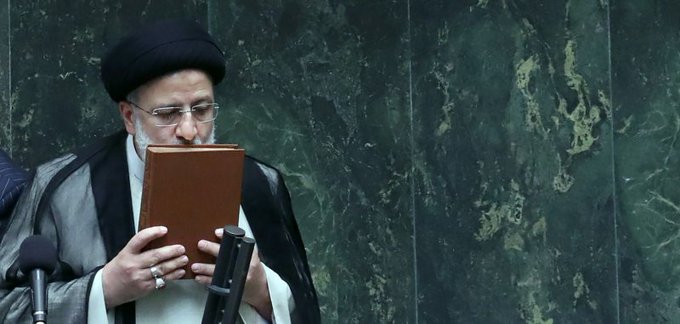SCALES OF JUSTICE TIPPING AGAINST IRANIAN REGIME

THE SCALES OF JUSTICE TIP AGAINST THE IRANIAN REGIME
The scales of justice are beginning to tip against the theocratic Iranian regime. Following a rigged election, their new president, Ebrahim Raisi, a notorious executioner, was formally inaugurated on August 5th. There are widespread demands that he be indicted for crimes against humanity and held to account for his involvement in the massacre of over 30,000 political prisoners in Iran in 1988. Now, one of Raisi’s functionaries, Hamid Noury, has been arrested in Sweden and is facing prosecution for war crimes and for his involvement in the same massacre of Iranian political prisoners in 1988. The mullahs are quaking in their shoes at the evidence Noury may provide.
The indictment for war crimes against Hamid Noury has its origins in the armed conflict that took place between Iran and Iraq from 1981-1988. The People’s Mojahedin of Iran (PMOI)/Mojahedin e-Khalq (MEK), who had been outlawed and hunted down by the mullahs following the 1979 revolution, fought back against the Islamic Revolutionary Guards Corps (IRGC), the clerical regime’s Gestapo. Iran’s Supreme Leader at that time, Ayatollah Ruhollah Khomeini, issued a fatwa against the PMOI/MEK, instructing that all political prisoners who claimed allegiance to the organization, including even prisoners who had served their sentences and been released, must be rounded up and executed. The mass hangings began in the summer of 1988.
The Swedish judiciary have cited evidence that a large number of PMOI/MEK prisoners were executed between 30 July and 16 August 1988 in the Gohardasht prison in Karaj, Iran, where Hamid Noury was assistant to the deputy prosecutor. The indictment claims that Noury was “suspected of participating, together with other perpetrators, in these mass executions and, as such, intentionally taking the lives of a large number of prisoners, who sympathised with the Mujahedin and, additionally, of subjecting prisoners to severe suffering which is deemed torture and inhuman treatment.”
The Swedish indictment claims that there was a connection between the Iran-Iraq conflict and the subsequent mass execution of PMOI/MEK supporters and that therefore Nouri is potentially guilty of a grave war crime committed in violation of international humanitarian law. Under the terms of the Swedish Penal Code “War crimes are considered to be some of the most serious criminal acts not only within our national legislation, but also within the international law. These types of crimes are regarded as so grave that, irrespective of who committed them or where they were committed, national courts are able and obligated to conduct proceedings where necessary. Therefore, legal proceedings can be initiated also in Sweden, due to international obligations and the principle of universal jurisdiction.”
The Swedish prosecutors have gathered extensive evidence from witnesses and survivors of the 1988 massacre and intend to open court proceedings against Hamid Noury on the 10th of August. The trial is anticipated to last for at least 9 months. The evidence makes for grim reading. It is alleged that Noury helped with the selection of PMOI/MEK prisoners who were brought before a summary court where they were asked simply if they still supported the PMOI/MEK. If, during this two-minute hearing, they answered ‘yes’, they were immediately led to the so-called ‘death corridor’ by Noury, where he would order them to stand in line, sometimes for hours, before escorting them to the execution chamber, where they would be made to watch other prisoners being hanged, before being executed themselves. Nouri often attended and participated in the hanging of prisoners.
Hamid Noury was arrested at Stockholm’s Arlanda Airport on 9th. November 2019. He had been warned by an authority of the mullahs’ regime that he risked arrest if he travelled to Sweden, but Noury brazenly boasted that he spent ten days in Sweden every year and was not perturbed. Now evidence has emerged that suggests the Iranian regime may be trying to manipulate the trial in Sweden. The War Crimes Unit (WCU) of the National Operations Department (NOA) of the Swedish Police, tasked with investigating Noury’s crimes, released a series of documents, including an email from Noury to an Iranian-Swedish national called Iraj Mesdaghi, who claims to be among the survivors of the 1988 massacre and is one of 29 plaintiffs in the proceedings, the majority of whom are PMOI/MEK supporters.
The Swedish prosecutors say that Iraj Mesdaghi’s email address was found on Hamid Noury’s phone and claim that Noury had sent two emails to Mesdaghi’s on January 17, 2019 (10 months before Noury’s trip and subsequent arrest in Sweden). Noury denies knowledge of Mesdaghi’s email address and ludicrously claims that he does not know how to send emails. According to the Iranian diaspora, Mesdaghi was a former PMOI/MEK supporter who had been arrested in Iran in the early 1980s and had agreed to collaborate with the Iranian regime’s security apparatus. His emergence as a plaintiff in the case against Hamid Noury and the exposure of email communications between them, has prompted Swedish prosecutors to question Noury and Mesdaghi about the nature of their communications. For his part, Mesdaghi told the Swedish investigators that he could not remember receiving any emails from Noury.
Many of the remaining genuine plaintiffs in the case have given evidence by video link from Ashraf 3, the headquarters of more than 2,500 PMOI/MEK supporters in Albania and from other countries around the world. The plaintiffs are mostly freed prisoners who witnessed the crimes committed by Hamid Noury in the death corridor in Gohardasht Prison during the 1988 massacre.
The trial in Sweden is likely to be a direct embarrassment to Iran’s executioner president Ebrahim Raisi, whose hands-on role in the killing of thousands of political prisoners, including teenagers and even pregnant women, will be exposed to the world’s press.
